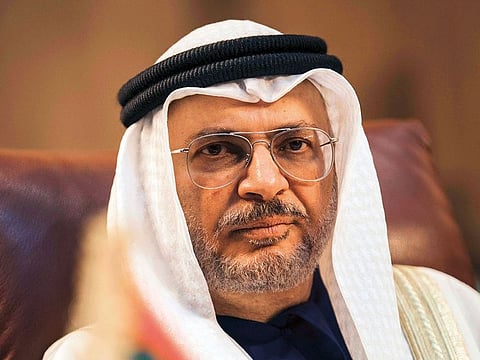Gargash: UAE-Israel accord not at expense of Palestinian issue
UAE minister points at ending of Israeli annexation as important step towards peace

Abu Dhabi: UAE Minister of State for Foreign Affairs, Dr. Anwar Mohammed Gargash, has reiterated the peace treaty with Israel “will not be at the expense of the Palestinian cause and the inalienable rights of the Palestinian people.”
Addressing the Arab foreign ministers’ meeting Wednesday, he said that the treaty “includes an Israeli agreement to stop annexing Palestinian lands, which constitutes an important achievement and step towards peace, and the fulfillment of a demand that the member states and the international community have agreed upon, in addition to being one of the goals contained in the Arab Peace Initiative to reach a just and sustainable solution to this issue.”
Gargash said: “There is a real opportunity to revive peace efforts and initiatives on the issue of the Arab-Israeli conflict,” noting that “the solution to the issue is in the hands of the Palestinian and Israeli sides.”
He added: “It must be stressed that the UAE’s decision on normal relations with Israel is a sovereign one, and within the recognised sovereignty of the nation state over its decisions, and it is not directed against any party, and it is not linked at all to the polarisations that the region is witnessing, unfortunately.
“Rather, in its basic content, it seeks to distinguish between the political situation and the normal relations that the UAE believes will lead to opening new horizons that support the issues of prosperity and stability in the region.”
Gargash explained that “the increasing volume of challenges and crises facing our Arab region requires collective action, an increase in cooperation and coordination, dealing with these challenges with rationality, wisdom and balance, giving priority to political solutions over escalation and confrontation, to achieve everything that would lay the foundations for development, security, stability and peace in the region and pushing for the strengthening of joint Arab action, in a way that achieves the hopes and aspirations of our peoples.”
He pointed out that “foreign interference in the internal affairs of Arab countries is still continuing, which has led to the emergence of new crises and worked to increase the pace of extremism and terrorism, support terrorist groups and armed militias, and destabilise security and stability in the region, which has become intolerable to more conflicts and challenges.”
Gargash said: “Turkish interference in the internal affairs of Arab countries is a clear example of negative meddling in the region, as it continues its provocative actions, whether directly in the Arab countries or through their proxies from militias and armed groups, in addition to making statements threatening the sovereignty, security and stability of states, and their continuing threat to the security and safety of maritime navigation in the Mediterranean waters, in a clear violation of relevant international laws and conventions and a breach of state sovereignty.”
The UAE minister said that Iranian interference “is still continuing through its support for armed militias and terrorist groups in some Arab countries, and Iran continues to threaten the security and safety of maritime traffic, energy supplies in waterways in the region and its development, explaining that “states’ respect for their legal obligations and the principles of good neighborliness will remain the basic requirement of the UAE”, which “renews its call on Iran to positively respond to its repeated calls for a peaceful solution to the issue of the three occupied Emirati islands, Greater Tunb, Lesser Tunb and Abu Musa, through direct negotiations or resorting to the International Court of Justice.”
He reaffirmed the UAE’s support to the coalition in support of legitimacy in Yemen, led by Saudi Arabia, urging all parties in Yemen to take clear steps to implement the Riyadh Agreement and avoid escalation, and the necessity for a ceasefire, given that the complete implementation of the Riyadh Agreement is a basis for political action in the next phase.
“We also affirm our support for the efforts of the UN envoy to Yemen Martin Griffiths to reach a peaceful and sustainable solution to the Yemeni crisis, and the UAE continues to support the Yemeni people in various development, humanitarian and charitable sectors to overcome the challenges they face,” Gargash said.
Gargash strongly condemned the continuation of terrorist attacks by the Houthi militia on the territory of Saudi Arabia, and the attack on its civilian and vital infrastructure with the support of Iran, which is a flagrant violation of international humanitarian law, reaffirming the need to stop the repeated attacks on the Kingdom, and to work together to secure international navigation and energy supplies, and the search for solutions, based on respect for sovereignty and non-interference in the internal affairs of states.
Sign up for the Daily Briefing
Get the latest news and updates straight to your inbox









